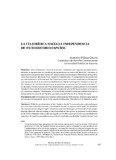Mostrar el registro sencillo del ítem
La vía jurídica hacia la independencia de un territorio español
| dc.creator | Pérez Calvo, Alberto | es_ES |
| dc.date.accessioned | 2018-02-28T12:27:24Z | |
| dc.date.available | 2018-02-28T12:27:24Z | |
| dc.date.issued | 2013 | |
| dc.identifier.issn | 0213-5795 | |
| dc.identifier.uri | https://hdl.handle.net/2454/27596 | |
| dc.description.abstract | Ante el llamado “Derecho a decidir” defendido por algunos partidos nacionalistas, se apunta que la Constitución Española no reconoce tal “derecho”. Además, el ejercicio de este pretendido “derecho” debería ejercerse mediante referéndum de la población directamente afectada. Pero, según la Constitución, el competente para promover un referéndum es el Presidente del Gobierno quien no podría realizar jurídicamente esta operación dada la inconstitucionalidad del objetivo perseguido. Siempre sería posible reformar la Constitución para que se pudieran reconocer ese “Derecho a decidir” y su ejercicio. Desde el punto de vista internacional, tampoco cabría aplicar a un territorio español el Derecho de autodeterminación reconocido por la ONU por no darse al respecto los supuestos exigidos. Finalmente, si un territorio español declarara unilateralmente su independencia respecto de España, quedaría ipso facto fuera de la Unión Europea | es_ES |
| dc.description.abstract | With the proclamation of the “right to decide" by several some nationalist parties, it is noted that the Spanish Constitution doesn’t recognize such right". In addition, the exercise of this alleged "right" should be exercised through a referendum of the people directly affected. But according to the Constitution, the power to promote a referendum is the Prime Minister who could not legally act in this sense given the unconstitutional objective. It would be possible to amend the Constitution so that the “right to decide” and its exercise could be recognized. From the international point of view, it would not be possible to apply to a Spanish territory self-determination recognized by the UN because the conditions required are not accomplished. Finally, if a Spanish territory unilaterally declared its independence from Spain that territory would be ipso facto outside the European Union. | en |
| dc.format.extent | 16 p. | |
| dc.format.mimetype | application/pdf | en |
| dc.language.iso | spa | en |
| dc.publisher | Gobierno de Navarra. Departamento de Presidencia, Justicia e Interior | es_ES |
| dc.relation.ispartof | Revista Jurídica de Navarra, enero-diciembre, 2013. Nº 55-56, p. 147-161 | es_ES |
| dc.subject | Soberanía en la Constitución Española | es_ES |
| dc.subject | Referéndum | es_ES |
| dc.subject | Reforma agravada de la Constitución Española | es_ES |
| dc.subject | Derecho de autodeterminación | es_ES |
| dc.subject | Miembros de la Unión Europea | es_ES |
| dc.subject | Sovereignty in the Spanish Constitution | en |
| dc.subject | The referendum | en |
| dc.subject | Aggravated reform of the Spanish Constitution | en |
| dc.subject | Self-determination | en |
| dc.subject | Members of the European Union | en |
| dc.title | La vía jurídica hacia la independencia de un territorio español | es_ES |
| dc.type | info:eu-repo/semantics/article | en |
| dc.type | Artículo / Artikulua | es |
| dc.contributor.department | Derecho Público | es_ES |
| dc.contributor.department | Zuzenbide Publikoa | eu |
| dc.rights.accessRights | info:eu-repo/semantics/openAccess | en |
| dc.rights.accessRights | Acceso abierto / Sarbide irekia | es |
| dc.type.version | info:eu-repo/semantics/publishedVersion | en |
| dc.type.version | Versión publicada / Argitaratu den bertsioa | es |


